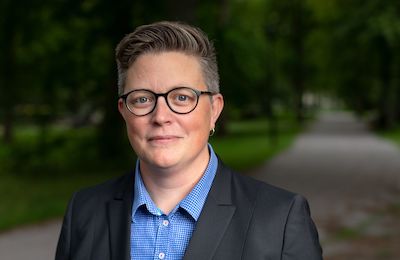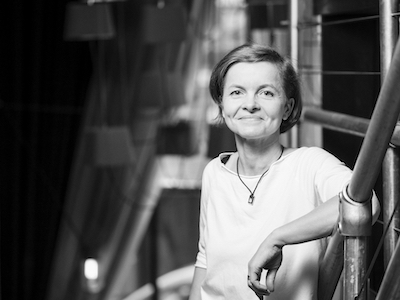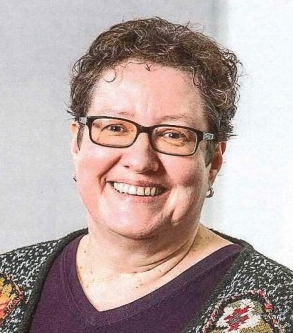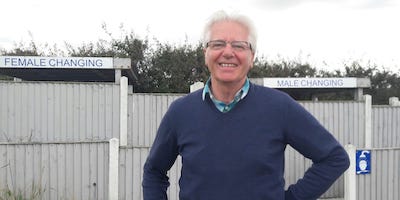Download as pdf
Lucy Avraamidou (University of Groningen, Netherlands):

Title: Intersectional Approaches to Exploring Identity Politics in Physics: (Un)hidden stories.
By adopting an intersectional approach, in this talk, I will present the findings of an empirical study that aimed to examine the ways in which physics identity intersects with other identities (i.e., racial identity, gender identity, Islamic religious identity, social-class, single-motherhood, and ethnic identity) and influences women’s recognition as physicists. To do that I will draw upon a life-history, multiple case-study of three women in physics: a native to Western Europe, late-career white woman; two immigrant women to Western Europe, one is an undergraduate student of colour, and the other, an early-career Muslim woman. With evidence gathered from this empirical study I will argue that a conceptualization of physics identity that does not value people for who they are in their entirety, made up of multiple and intersectional identities, but only values how people produce or consume scientific knowledge is exclusionary and only serves to create suffering. From a theoretical perspective, I will problematize a non-intersectional conceptualization of physics identity that ignores personal histories, subjectivities and diversities by idealizing certain behaviours and practices (e.g., whiteness, masculinity, individualism) and essentially cutting off others (e.g., femininity, blackness, religion, single motherhood). For an exploration of women’s participation in physics, any attempt to examine gender in isolation instead of in intersection with other multiple identities is an ill-equipped way of examining the complexities and dynamics of contemporary identity politics embedded in physics (non)participation.
Biography: Lucy Avraamidou is an Associate Professor of Science Education and the Head of the Institute for Science Education and Communication at the University of Groningen in the Netherlands. She currently leads a team of 8 doctoral students and 1 postdoctoral researcher and serves as the national coordinator for 6 EU-funded projects (EU-H2020 & Erasmus+). She received her PhD in Science Education from the Pennsylvania State University in the USA and upon its completion she worked as a Research Associate at the Center of Informal Learning and Schools (CILS) at King's College London in the UK. Prior to her appointment at the University of Groningen in 2016, she worked as an Assistant/Associate Professor at the Education Department of the University of Nicosia, in Cyprus. Her research is associated with theoretical and empirical explorations of what it means to widen and diversify science participation in school and out-of-school settings through the lens of intersectionality. At the heart of the account of her work is an exploration of individuals' identity trajectories and negotiations with the use of narrative and life-history methods.
Anna Danielsson (Stockholm University, Sweden)

Title: Unexpected trajectories into a ‘hard’ science: Gender, identity, and culture in physics.
Physics is considered a ‘hard’ science; hard both as in difficult and as in providing hard, objective knowledge claims. It is strongly aligned with cleverness, and also with masculinity. Not surprisingly, physics does an extremely good job at keeping people out. Almost everyone learns that physics is not for them: Patterns of low and inequitable participation are reproduced throughout most of the Global North. Yet, students from under-represented groups do find their way to higher education physics, and this talk will focus on the trajectories of some of them. The talk will also give an introduction to different ways in which the culture of physics can be understood as gendered and how this can affect students’ identity work.
Biography: Anna T. Danielsson is Professor of Science Education at Stockholm University. Her research focuses on issues of gender and identity in the context of teaching and learning science, with a particular interest in higher education physics. She recently published the co-edited book Physics Education and Gender: Identity as an Analytic Lens for Research (together with Allison J. Gonsalves) and her work has also been published in numerous international journals, including International Journal of Science Education and Physical Review Physics Education Research. Prior to her appointment at Stockholm University, she has held positions at Uppsala University, King’s College London, and University of Cambridge.
Aleksandra Derra (Nicolaus Copernicus University in Toruń, Poland)

Title: Beyond nature/culture division. Karen Barad’s new feminist materialism
Karen Barad’s ideas and theories can be considered a paradigmatic example of the new feminist materialist approach, which constructs the complicated body of philosophical views. We can initially describe them by the complicated categories like antiessentialism, antirelativism, antirepresentationalism, realism without representation, posthumanist views of performativity, the dynamic relational ontology of phenomena that are constituted in intra-actions, denial of social constructivism (Barad 2003, 2014, 2015). Barad encourages us to use the potential of physics-philosophy of Niels Bohr with the metaphors which describe puzzling phenomena of quantum mechanics (Barad 2007). Enthusiastically sharing her persistence of understanding materiality in its natureculture continuum (Barad 2012), I want to elaborate if we can overcome nature/culture division in philosophy and science. Therefore I will problematize the relation between so-called naturalistically oriented scientific disciplines and socio-culturally oriented disciplines following Barad’s understanding of materiality and her agential realism (Barad 1998). I propose to treat humanities as a unique form of the laboratory of thinking where we can experiment on new modes of grasping and conceptualizing scientific knowledge in a philosophical and feminist way. I will argue that taking into account the changes that feministically conscious scholars have introduced to scientific culture; the feminist approach can be considered pioneering in its depiction of the complementary nature of humanistic knowledge and empirical sciences (Keller 1995, Fausto-Sterling 2000). As Donna Haraway points out, feminist theories can be seen as introducing a kind of missing link between scientific studies and political subjectivity not separated from the cognitive dimension (Haraway 1984).
Biography: Philosopher, philologist, translator. Associate professor in the Institute of Philosophy, Nicolaus Copernicus University (NCU) in Toruń, Poland. She was the research visiting fellow at Centre for Gender and Women’s Studies, Trinity College, Dublin, Ireland (2013-2017), and the visiting fellow at the Centre for Humanities Utrecht University, Holland (2011). From 2013 till 2017, cofounder and director of postgraduate gender studies at Faculty of Humanities at NCU, and from 2018 till now, managing editor of “AVANT. Trends in Interdisciplinary Studies“ (avant.edu.pl/en/). Her work focuses on gender, subjectivity, and body problems in contemporary philosophy and cognitive science. She publishes within the field of contemporary feminist philosophy and (feminist) science and technology studies. From November 2020, she has been appointed the Deputy Rector for equality at NCU. Web page: Aleksandra Derra (aleksandra-derra.eu)
Helene Götschel (Freie Universität Berlin, Germany)

Title: Negotiating Narratives of Diversity and Equity in Physics
A majority of physicists is white, healthy, heterosexual, and cis-male. Increasingly, this is understood as a problem. Scientific societies, academic workplaces and research institutes are starting to welcome diversity in physics and to create and promote an appreciative work environment for all. Yet, diversity is not only a characteristic of people. It is a framework to reflect on the reproduction of social inequalities and can be understood as an eye opener for the gendered, classed and raced politics of knowledge-producing processes in STEM.
In this talk we reflect on the power of norms and exclusions in the culture, representation, and teaching of physics. We look, for example, at communications in research labs, educational settings at universities, physicists’ behavior at conferences, and contents of physics textbooks. In addition, we discuss strategies to invent and present new, positive narratives about diversity and physics in the 21st century. These strategies may help to create and promote physics as a more welcoming environment for everybody. Moreover, awareness and understanding of the results of Gender and Diversity Studies in physics will foster the development of contemporary physics.
Biography: Helene Götschel is visiting researcher at the ‘Research Group of Gender & Science Studies in Physics’ at the department of physics at FU Berlin, Germany. Previously, she had an interim professorship for Science Education at the Institute for General and Vocational Pedagogy at Technical University of Darmstadt, Germany and was Professor for Gender and Diversity in Engineering and Computer Science at the University of Applied Sciences and Arts, Hannover, Germany. She taught physics and interdisciplinary courses to students in electrical, mechanical, and industrial engineering as well as gender studies courses in teacher training. In her lifelong learning process, she was trained in physics (with a focus on experimental particle physics), history of science, social history, higher education, and gender studies. Her transdisciplinary research explores the entanglement of gender, diversity and physics.
Jeff Hearn (Örebro University, Sweden)

Title: What might men and masculinities have to do with physics and physicists?
My academic knowledge of physics is certainly minimal, despite walking past the Helsinki University particle accelerator most days. However, today I have been asked to talk about how debates on men and masculinities might be of interest to physics and physicists. Gender inequalities persist in universities, higher education, science – and physics. Such gender inequalities do not only concern women and girls; they also concern men and boys, as well as LGBTIQ+ people. You might imagine it is quite difficult to talk about what happens in higher education and the academy without discussing men, masculinities and men’s practices, but this appears not to be so. Many documents on gender equality in academia are strangely silent on the question of men, that is, the majority of academics working there, especially at more senior and leadership levels: men are an “absent presence”. This careless avoidance is rife in mainstream academia and “normal science”. Here, I discuss, first, some issues in contemporary critical theorising, research and debate on men and masculinities. Second, I suggest some links of science and physics to analyses of men and masculinities (everyday situations of gendered individuals, academic identities and careers; how academia and science are organised and managed in contemporary academic organisations and cultures; and, gendered knowledge, including gender in the construction of scientific knowledge itself). Third, I highlight possible actions for changing men and masculinities in science at individual, interpersonal, organisational, national and transnational levels of intervention. Men and masculinities should not be taken-for-granted in “(academic) business as usual”.
Biography: Jeff Hearn is originally from London, and studied Geography at Oxford, Urban Planning and Sociology at Oxford Brookes, Organisation Studies at Leeds Universities, before completing his PhD, teaching, and latterly becoming head of department, Bradford University. In 1995 he moved to Manchester University, the first full Research Professor in Social Sciences. He has worked many years in the Nordic region, mainly in Finland, also Professor II, Sociology, Oslo University, and Professor, Gender Studies, Linköping University. Currently, he is: Senior Professor, Gender Studies, Örebro University, Sweden; Professor Emeritus, Management & Organisation, Hanken School of Economics, Finland; Professor of Sociology, University of Huddersfield, UK; Professor Extraordinarius, Institute for Social and Health Sciences, University of South Africa; Fellow, UK Academy of Social Sciences; honorary doctor, Lund University, Sweden; he was Affiliated Professor, Pufendorf Institute for Advanced Studies, Lund in 2019. His research focuses on gender, sexuality, violence, age, work, organisations, management, policy, ICTs, transnational processes, and social theory. He is co-managing ed. Routledge Advances in Feminist Studies and Intersectionality book series; co-ed. NORMA: International Journal for Masculinity Studies; and was (Co-)Chair, RINGS: International Research Association of Institutions of Advanced Gender Studies 2014-2020. Recent books include: Men of the World: Genders, Globalizations, Transnational Times, Sage, 2015; Men’s Stories for a Change, co-author, Common Ground, 2016; Revenge Pornography, with Matthew Hall, Routledge, 2017; Engaging Youth in Activism, Research and Pedagogical Praxis: Transnational and Intersectional Perspectives on Gender, Sex, and Race, co-ed. with Tamara Shefer, Kopano Ratele, Floretta Boonzaier, Routledge, 2018; Unsustainable Institutions of Men, co-ed. with Ernesto Vasquez del Aguila, Marina Hughson, Routledge, 2019; Does Knowledge Have a Gender? co-ed. with Sofia Strid, Dag Balkmar, Louise Morley, 2020; and Age at Work, with Wendy Parkin, Sage, 2021.
Alexandra Kalev (Tel Aviv University, Israel)
Title: Faculty Diversity Programs: Best Practices and Worst.
Despite the importance of diversity among academic faculty for students' experience and success, and despite laws forbidding discrimination, progress on the faculty diversity has been very slow. Women and minorities still take longer than white men to climb the academic ranks; they are more likely to leave academia; and women’s academic careers are stalled or diverted by family formation while men’s are unaffected or accelerated. The Covid-19 crisis threatens to deepen these trends. There are many studies of the sources of disadvantage, but few of remediation efforts. There are many programs that leaders of universities and colleges adopt to increase diversity, but few know what actually works. In this talk I will present results from the first systematic study comparing alternative policies designed to improve opportunity for women and minorities in STEM fields, based on longitudinal data on 600 U.S. universities and colleges faculty composition and personnel practices, between 1993 and 2015. Main findings point to policy-universalism and enhancing faculty engagement as features of effective diversity programs. In contrast, targeted work-life policies, and programs that blame and threaten faculty surface as features of less effective programs that can backfire. The research is conducted in collaboration with Frank Dobbin, Kwan Kim Woo and Leroy Gonsalves at Harvard University, and Gal Deutsch at Tel Aviv University.
Biography: Alexandra Kalev, a Princeton University PhD, is an Associate Professor of Sociology and Anthropology at the Tel-Aviv University. Kalev studies organizations, inequality, and public policy. With Frank Dobbin, Kalev develops an evidence-based approach to diversity management in corporations and universities. Highlights from this research were featured in the July-August 2016 issue of the Harvard Business Review and received the HBR McKinsey Award for 2016. Current research, to be featured in the May-June 2020 issue of HBR, looks at effective ways to reduce sexual harassment in corporations and universities. In research on Israel, Kalev studies the emergence and effects of diversity programs in for-profit and nonprofit organizations, the integration of Israeli-Palestinians in the Jewish economy, and the social construction of merit in high-tech organizations. Kalev is a member of the Advisory Committee to the Israeli Equal Employment Opportunity Commission and recently developed a Diversity Index, ranking demographic composition and pay gaps of the 20 largest private economy sectors in Israel. Kalev is also the chief editor of "Israeli Sociology", a Hebrew language academic Journal. Kalev’s research has been published in leading U.S. academic journals, and covered major media outlets.
Ioana Latu (Queen’s University of Belfast, Northern Ireland, UK)

Title: Inclusion Really Does Matter: Improving attitudes towards Gender Equality Initiatives among STEM faculty.
We present data from six experiments with STEM academics about effective ways to design gender equality initiatives in STEM academia to increase engagement. Our findings relate to both the framing and the content of such initiatives and allow for evidence-based recommendations to improve engagement, and ultimately effectiveness of gender equality initiatives.
Biography: Dr. Ioana Latu is a Senior Lecturer in Social Psychology at Queen’s University Belfast. She obtained her PhD in Social Psychology at Georgia State University, USA in 2010. Before joining Queen’s in 2016, she was an Assistant Professor of Psychology at Rutgers University, USA and a Fellow of the Swiss National Science Foundation at the University of Neuchâtel in Switzerland.
Ioana’s research focuses on understanding and reducing intergroup biases, with a specific focus on gender biases in organisational and academic contexts. She is particularly interested in analysing the interpersonal mechanism through which women are negatively influenced by existing implicit and explicit gender stereotypes in actual social interactions such as job interviews and negotiations. Her current research, funded by an EPSRC Inclusion Matters grant, seeks to understand and reduce potentially negative attitudes towards gender equality initiatives in STEM fields.
Ioana is a SWAN Champion in the School of Psychology at Queen’s University Belfast, a School which renewed its gold award in 2017. She also teaches Psychology of Gender at the undergraduate level.
Londa Schiebinger (Stanford University, US)
Title: Gendered Innovations: Enhancing Excellence in Science & Technology
How can we harness the creative power of sex, gender, and intersectional analysis for discovery and innovation? Gendered Innovations was developed through interdisciplinary collaborations involving over 200 experts from across the United States, Europe, Canada, and Asia. Major funders include the European Commission, the U.S. National Science Foundation, and Stanford University. The question that remains unanswered is: how is gender or intersectional analysis relevant to physics? Gendered Innovations has no case studies in theoretical physics. Are there important examples in applied physics—and what are these? How do we move forward in research and curriculum?
Please see: Gendered Innovations; AI can be Sexist and Racist—It’s Time to Make it Fair Nature, 559.7714 (2018), 324-326; Sex and Gender Analysis Improves Science and Engineering Nature, 575.7781 (2019), 137-146; Gendered Innovations 2: How Inclusive Analysis Contributes to Research and Innovation (Luxembourg: Publications Office of the European Union, 2020), and Ensuring that Biomedical AI Benefits Diverse Populations eBioMedicine, 103358 (2021). For late-breaking news on research in this area, join the Gendered Innovations listserv.
Sigrid Schmitz (Center for transdisciplinary Gender Studies, Albert-Ludwigs-Universität Freiburg, Germany)
Title: Necessary Literacy for the Debate about Disciplinary Images and Cultures
The debate about a required change in disciplinary images and disciplinary cultures in STEM disciplines to reach out for more gender and intersectional equity, to some extent, has infiltered the targeted fields. The persistence of these images and cultures and their discriminatory impacts, however, cannot be broken up without a deeper understanding of how individual capacities are framed by myths of (neuro-)biological differences. Gendered and further devaluations of cognitive performance by brain basics often are taken for granted to legitimize who could be a successful techno-scientist and who doesn’t. In my talk I present the long-standing record of neuro-feminist analyses on the biases and distortions within neuroscientific knowledge production concerning a seemingly binary gendered brain, inseparably interconnected with racialized assumptions. Furthermore, I unfold the latest research of NeuroGenderings network scholars (https://neurogenderings.wordpress.com/) on the bio-socio development of the brain, its entanglement and contingency within powerful socio-cultural contexts. I show how these multiple perspectives prepare a ground for intersectional -STEM dialogue. The Open Access Portal Gendering STEM digital (Gendering MINT digital, https://www2.hu-berlin.de/genderingmintdigital/) provides Open Educational Resources for facilitating the development of a techno-scientific literacy within STSM fields (including physics) for students, teachers and researchers. Literacy means the competence to understand the social embeddedness of the knowledge production in the own discipline and to reflect on its outcomes on the individual as well as the societal level. With reference to some of its English translated learning units and videos on Gender & Physics, I will draw a line from the brain-gender debate to its impacts on disciplinary images and cultures in Physics, reaching out for strategies for facilitating a cultural change.Biography: Sigrid Schmitz, PhD in biology, for more than 30 years researches and teaches on Gender in STEM. She chaired the Competence Centre for Gender in Natural and Computer Science [gin] (University of Freiburg, 2000-2009), was Professor for Gender (University of Vienna, 2010-2015), and chaired the project Gendering STEM [MINT] digital (HU Berlin, 2017-2020). Further research topics are on brain sciences, neuro-cultures and feminist epistemologies. Some of her publications concerning the topic of this talk are: Feminist neuroscience: a critical review of contemporary brain research (2014, Frontiers in Human Neuroscience 8, doi: 10.3389/fnhum, together with Grit Höppner); On the use of innovation arguments for getting gender research into STEM (2018, Gender Studies and the New Academic Governance, ed. Heike Kahlert), and Open Educational Resources for STEM. Stimulate Reflection on Gender in Science and Technology (2020, EASST4S Joined Conference Prague, https://www.gender.hu-berlin.de/de/forschung/GenderingMINTdig/inhalte/genderingmint-digital_en, together with Göde Both).




